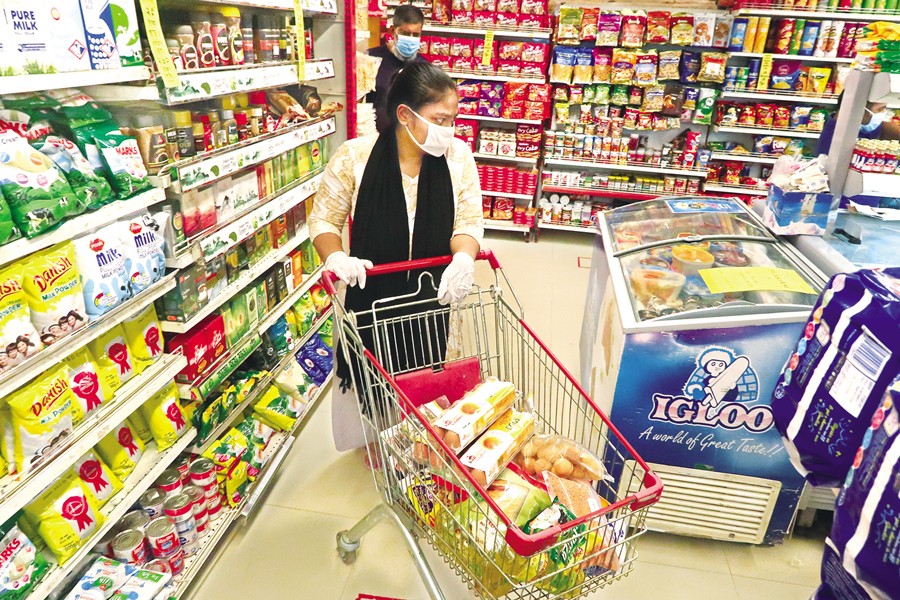
Published :
Updated :

Imports plummeted in a double-digit contraction in the first quarter of this fiscal with consumer goods accounting for the biggest fall by nearly 48 per cent that further impacts economic situation.
Businesspeople and economists see such import contraction as a double bind--it stokes consumer-price inflation and may lead to industrial-production deflation.
Official statistics show the country's import volume fell 18 per cent during the July-September period year on year to US$15.9 billion. During the same period a year before it was $19.4 billion.
Fresh opening of import LCs fell 18.03 per cent during the July-September of FY24 as a result of depreciation pressure on foreign exchange and close monitoring of LC operations by the central bank of Bangladesh.
Economists and businesspeople say lower-than-necessary imports have downstream economic implications as the supply chains get into volatility for want of adequate supplies, as is evident from what is dubbed 'price anarchy' right now in markets.
The overall import trade in terms of opening letters of credit dipped to US$ 15.9 billion, down 18.03 per cent during the first quarter of the current fiscal year, 2023-24, over its corresponding period a year before, data compiled by the Bangladesh Bank showed.
Supplies of consumer goods like cereals, edible oils and so took a knock as the import category dropped by 48 per cent to $1.4 billion year on year in July-September 2023, according to the data.
The import of capital machinery also plunged, by nearly 24 per cent to $547 million, with its implications on production chain as well as domino effect on the market.
And the import of intermediate goods -- again a necessity for industrial production -- dropped nearly 28 per cent to $ 1.1 billion during the period under review.
Another squeeze on economic activity comes from fuel front -- petroleum imports registered a fall by 12.4 per cent to $2.4 billion over the corresponding period.
And industrial raw-material imports declined by 22.6 per cent to approximately $5.2 billion during this past July-September period.
A saving grace is seen only in 'others' category, with an increase in imports by 5.24 per cent to $5.2billion.
Bangladesh mainly makes cash import, accounting for around 60 per cent of the turnover. Import on buyer credit, loans and grants as well as IDB loan also takes place.
Economists and manufacturers find two main reasons behind the sharp fall in imports. Dollar shortage is one as the banks are unwilling to open LCs. They also identified higher inflation which helps trim import of some luxury goods and upcoming general election.
Dr Ahsan H Mansur, executive director of the Policy Research Institute of Bangladesh (PRI), blames dollar shortage for the downturn in capital-machinery imports.
"There is also uncertainty in both export and domestic markets. Generally, sales are down," he says explaining the crunch situation.
The implication of this is that the productive capacity of the economy will not increase, and it may hit the GDP.
"To my mind, the dollar-market volatility is the key reason as many banks are not willing to open LCs against imports," says Dr M Masrur Reaz, chairman of Policy Exchange of Bangladesh. Such a continuous fall in imports is good when the balance-of-payments situation is considered. But "ultimately it will impact employment and growth".
The economist notes that the global commodity market is favourable as prices over there have eased. But "we fail to import because of dollar".
Interbank dollar-taka exchange rate is now Tk 110.5, according to Bangladesh Bank.
Anwar-Ul Alam Chowdhury Pervez, managing director of a leading textile corporate -- Evince Group -- told the FE that the main reason for drop in imports is dollar crisis.
"Banks are not showing interest in LC opening," he says about the double binds the businesses are in.
He says many exporters have been failing to import industrial raw materials-constraining industrial throughput. And orders from buyers also got reduced in recent months for large inventory in stores.
Chowdhury, a former chief of BGMEA, however, holds the hope that the demand may pick up when the central bank should encourage import.
jasimharoon@yahoo.com


 For all latest news, follow The Financial Express Google News channel.
For all latest news, follow The Financial Express Google News channel.